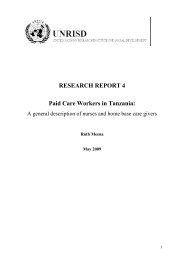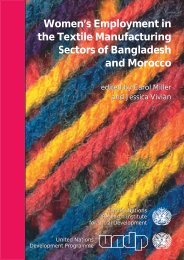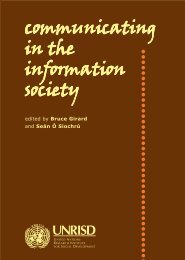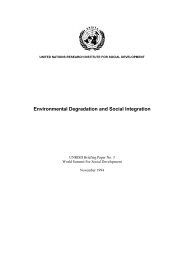Beyond Pragmatism: Appraising UN-Business Partnerships
Beyond Pragmatism: Appraising UN-Business Partnerships
Beyond Pragmatism: Appraising UN-Business Partnerships
Create successful ePaper yourself
Turn your PDF publications into a flip-book with our unique Google optimized e-Paper software.
<strong>UN</strong>RISD PROGRAMME ON MARKETS, BUSINESS AND REGULATION<br />
PAPER NUMBER 1<br />
Summit on Sustainable Development (WSSD), and the unfolding of the process of drafting the<br />
Norms on the Responsibilities of TNCs with regard to Human Rights. Several NGOs and<br />
networks pushed for corporate accountability as an alternative to CSR. Corporate accountability<br />
implied both an obligation to answer to different stakeholders and the imposition of penalties in<br />
cases of non-compliance with agreed standards (Bendell 2004a; Newell 2002). Specific proposals<br />
for a corporate accountability convention or organization did not get far, but the notion of<br />
corporate accountability was discussed and did get a mention in the final declaration of the<br />
WSSD. Big business lobbied forcefully against any such harder regulatory approaches, and<br />
PPPs emerged as a concrete alternative. At the summit some 200 PPP initiatives were<br />
announced. In practice many were no more than ideas and took years to materialize, 15 if at all,<br />
but the discourse itself was powerful enough to take some of the wind out of the sails of a shift<br />
toward corporate accountability.<br />
The evolution of the Global Compact—the <strong>UN</strong>’s flagship partnering initiative—and the relative<br />
ease with which big business has accommodated to some measure of accountability and other<br />
reforms (discussed below), also, to some extent, conform to this logic. Since its inception, the<br />
Global Compact has been on the receiving end of considerable criticism from civil society and<br />
other actors. The Compact was not only seen as “lacking teeth”, but also as a mechanism for<br />
“bluewashing” corporations that could project a socially responsible image through their<br />
association with the <strong>UN</strong> (TRAC 2000). Several leading activists, advocacy and research NGOs,<br />
and other civil society organizations from around the world signed a “Citizens Compact” in<br />
2000. 16 Some went on to form the Alliance for a Corporate-Free <strong>UN</strong>. In general, these<br />
organizations called attention to the need to restrict commercial and corporate influences in <strong>UN</strong><br />
affairs. 17<br />
While sharing these concerns, several high profile advocacy and development NGOs joined the<br />
Global Compact in an attempt to reform from within. In 2003, however, their patience ran thin,<br />
and a group of “Compact NGOs”—Human Rights Watch, Amnesty International, Oxfam<br />
International and Lawyers Committee for Human Rights—went public with their concerns. In a<br />
letter to the <strong>UN</strong> Deputy Secretary-General they complained of the weakening of certain<br />
accountability mechanisms, limited evidence of progress, and lack of criteria for dealing with<br />
companies alleged to be in breach of the principles. They also stressed the need to monitor<br />
compliance through the annual reporting mechanism; to disclose publicly the quality of<br />
information provided by companies; for greater leadership by the Global Compact and<br />
companies in promoting the principles; the application of the principles in <strong>UN</strong> procurement<br />
policies; and greater participation of human rights NGOs and trade unions when the Global<br />
Compact is applied at the national level. 18 In June 2004, another Compact NGO, Human Rights<br />
First, denounced the extent to which companies could use the Compact as a marketing tool and<br />
called for a more “results-oriented structure and approach” that would include a transparent<br />
process for evaluating company participation, and greater interaction between the Global<br />
Compact and certain other multistakeholder initiatives such as the Fair Labor Association. The<br />
NGO also denounced the “unfounded attacks” against the <strong>UN</strong> Norms on the Responsibilities of<br />
TNCs with Regard to Human Rights, and called on the Secretary-General to support this<br />
initiative. 19<br />
When government and corporate leaders met a few days later for the Global Compact Leaders<br />
Summit, numerous NGOs gathered for the Global Compact Counter Summit. They issued the<br />
Joint Civil Society Statement on the Global Compact and Corporate Accountability, reiterating<br />
some of these concerns and demands:<br />
15<br />
16<br />
17<br />
18<br />
19<br />
See United Nations Economic and Social Council, Commission on Sustainable Development (2004).<br />
See Citizens Compact on the United Nations and Corporations (CorpWatch 2000).<br />
See What is the Alliance for A Corporate-Free <strong>UN</strong>? (CorpWatch 2001).<br />
See www.globalpolicy.org/ngos/int/un/access/2003/0606compact.htm, accessed in July 2006.<br />
See www.globalpolicy.org/reform/business/2004/0604hrfirst.htm, accessed in July 2006.<br />
8
















